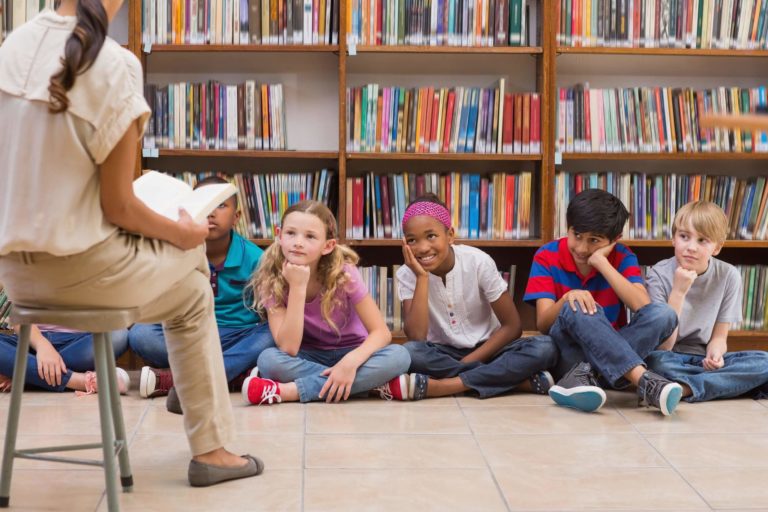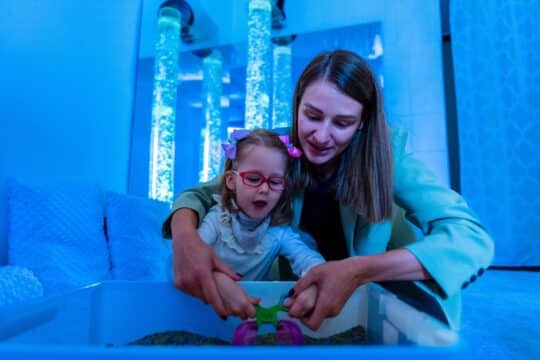School librarians are a vital part of a students’ journey to a lifelong love of reading and learning. They are not just matchmakers matching students with the right books, but they are literacy professionals that are highly trained in print, digital, and technological formats. Here we’ll take a closer look at how these literacy educators can enhance literacy instruction in your classroom.
What Does a School Librarian Do?
According to the , a school librarian, “works with both students and teachers to facilitate access to information in a wide variety of formats, instruct students and teachers how to acquire, evaluate and use information and the technology needed in this process, and introduces children and young adults to literature and other resources to broaden their horizons. As a collaborator, change agent, and leader, the school librarian develops, promotes and implements a program that will help prepare students to be effective users of ideas and information, a lifelong skill.”
What Makes the Librarian Qualified to Help?
School librarians play an important role in our students’ lives. They are qualified literacy educators who’ve taken the time to get a graduate degree and appropriate state certification as a school librarian. According to , skills gained during a library science program include: information science such as the history of books, censorship, printing, etc., online reference systems, internet search and research methods, organization of information, etc. These are a just a few of the many skills librarians gain during their studies to help support a school’s literacy program.
How the School Librarian can Enhance Literacy Instruction
School Librarians Assist with Digital Citizenship
Students are digital citizens before they even reach kindergarten. According to the , “More than one-third of parents with a child under 12 say their child began interacting with a smartphone before the age of 5.”
School librarians can help young students discern credible resources for themselves. They can teach students to understand what makes information credible as well as teach them the skills and habits that will keep them safe online.
School Librarians Implement Reading Strategies
School librarians can help reinforce skills taught in the classroom as well as help teachers implement specific reading strategies. For example, recognizing story structure such as sequencing, or practicing strategies to decode unknown words such as chunking. They can also provide support with literary elements, how to identify parts of book or construct meaning from text.
School Librarians Use Digital Tools to Teach Reading Skills
School librarians are experts in online resources. Through the use of digital tools, librarians can help elevate reading instruction. For example, though a management system such as Google Classroom librarians can show students how to use hyperlinks, hyperdocs, videos or other digital self-help tools to help make the learning process more personalized and easily understandable.
School Librarians Enhance Reading Skills through Makerspaces
The school library has been a central hub for since the Maker movement began. Makerspaces, a place for hands-on learning, are a non-traditional way to reinforce reading skills by helping students learn through doing. School librarians are utilizing makerspaces to enhance their reading instruction by developing characters using Legos, creating animating video book trailers, and using green screens to enhance book talks.
School Librarians Help Integrate Novel Engineering
Novel Engineering is an innovative approach to integrate engineering and literacy. School librarians can help students and classroom teachers use existing classroom literature (novels, expository text) as the basis for engineering design challenges while reinforcing literacy skills. Building 21st century skills, engaging all learners, introducing realistic engineering problems all while enhancing reading comprehension.
School Librarians Provide Guided Practice
One of the many ways school librarians can help enhance literacy skills is by encouraging guided practice and independent reading. In the online publication , authors Tammy S. Gruer and Karen M. Perry state, “Students who have an opportunity to practice reading aloud with a classmate will have more confidence in choosing books for independent reading.”
School Librarians are Informational Specialists
School librarians are specialists in curating print and digital resources. If you are looking for classroom materials or specific books, librarians can help. They can help students find information in books or on an online database so it will be readily available anytime they need it; over time, this helps students develop their own research and library skills. School librarians also have a comprehensive understanding of copyright and fair use guidelines so they can also advise teachers and students of their proper use.
The said it best when they said, “…school librarians and teachers are engaged in efforts to collaborate at various levels to increase student achievement and be more effective teachers.”
Through thoughtful collaboration, classroom teachers and school librarians can successfully enhance student literacy as well as improve student achievement.




